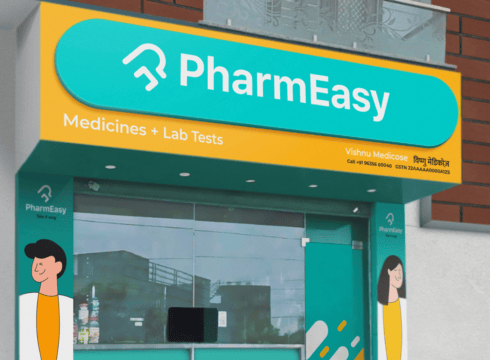The healthtech startup will use the funds raised to repay its loan to Goldman Sachs
PharmEasy’s existing shareholders TPG and Temasek are leading the rights issue, while Manipal Group’s Ranjan Pai is also expected to join the startup’s board
The rights issue will likely take place at a valuation of around $500 Mn-$600 Mn, a sharp drop from its valuation of $5.6 Bn in 2021
Inc42 Daily Brief
Stay Ahead With Daily News & Analysis on India’s Tech & Startup Economy
Amid serious financial troubles, healthtech startup PharmEasy has reportedly informed its board and investors that it is planning to raise around INR 2,400 Cr through a rights issue at a 90% discount to repay the loan it took from Goldman Sachs.
As per a report by the Economic Times, PharmEasy’s existing shareholders TPG and Temasek are leading the rights issue. Besides, Ranjan Pai, chairman of the Manipal Group, is also expected to join the company board.
The publication said PharmEasy parent’s API Holdings would issue new stock at INR 5 per share in its rights issue. This is in sharp contrast to the time when API Holdings raised funds at INR 50 per share value.
PharmEasy was not immediately available to respond to Inc42’s query on the matter.
Founded in 2015 by Dharmil Sheth, Dhaval Shah, Harsh Parekh, Siddharth Shah, and Hardik Dedhia, PharmEasy operates in the overarching healthtech domain, offering services from medicine deliveries to sample collections for diagnostic tests. PharmEasy’s parent company API Holdings has rapidly expanded on the back of venture capital and debt over the years and raised over $1.5 Bn, as per Inc42 data.
The Mumbai-based startup was last valued at $5.6 Bn in 2021.
As per the publication’s report, the rights issue will likely take place at a valuation of around $500 Mn-$600 Mn. A person in the know of the matter also said that PharmEasy’s previous valuation would be around $4.6 Bn, adjusted for the dollar-rupee rate.
Meanwhile, as per a report by Moneycontrol, API Holdings is under a lot of pressure to repay the Goldman Sachs loan as it had pledged shares of its subsidiary Thyrocare as collateral for the loan.
It must be noted that as per a recent report, PharmEasy breached its loan covenant terms in its INR 2,280 Cr ($285 Mn) Term B loan agreement with Goldman Sachs, within a year after raising the high-cost debt.
As per the loan terms, the epharmacy startup was supposed to raise an equity round of around INR 1,000 Cr ($120 Mn) but failed to do so despite trying for a year. The company had raised the debt to pay off a previous debt that it had taken from Kotak Mahindra Bank to buy Thyrocare.
“After the covenant breach, the board and shareholders wanted the loan to be repaid to Goldman Sachs. Also, the price of the share had to be readjusted as it was freely available for INR 20 in the grey market,” a person was quoted as saying by the Economic Times. Reportedly, he also said that PharmEasy had to choose between an outright distress sale or opt for a rights issue, which would also help current investors increase their stake in the company and bring down their cost of purchase.
Meanwhile, PharmEasy’s investors and the board have in-principle agreed to issue new employee stock options to the founders and the other employees in order to compensate for the massive value erosion.
PharmEasy cofounder and CEO Siddharth Shah will reportedly address the company’s staff on Wednesday (July 5) to explain the matter.
PharmEasy In Troubled Waters
From increasing debt to widening losses and delayed IPO, PharmEasy has been on a roller coaster ride over the last few years.
In FY22, PharmEasy’s consolidated loss widened to INR 2,731 Cr from INR 641 Cr in FY21, while its operating revenue grew to INR 5,729 Cr from INR 2,235 Cr in the previous fiscal. Meanwhile, the startup kept acquiring more companies that year and continued spending heavily towards employee benefits.
As troubles grew amid a severe funding crunch, PharmEasy laid off several employees in December 2022.
Meanwhile, the startup’s INR 6,250 Cr IPO plan also went haywire. PharmEasy filed its DRHP in November 2021 and received approval from SEBi in February 2022. However, it kept on delaying its IPO amid the downturn in the global market.
Recently, a few of its investors also slashed the startup’s valuation. While Janus Henderson cut its valuation to about $2.8 Bn, Neuberger Berman trimmed the valuation of API Holdings to $4.4 Bn in March this year from $5.6 Bn earlier.
{{#name}}{{name}}{{/name}}{{^name}}-{{/name}}
{{#description}}{{description}}...{{/description}}{{^description}}-{{/description}}
Note: We at Inc42 take our ethics very seriously. More information about it can be found here.


